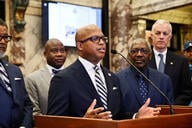You have /5 articles left.
Sign up for a free account or log in.

The Old Main building on the University of Arizona campus
aimintang/iStock/Getty Images Plus
A federal appeals court sided with the University of Arizona in a lawsuit brought by a former student who was physically assaulted by her ex-boyfriend, a former university football player, in an off-campus apartment and who argued the university’s “deliberate indifference” to the perpetrator’s prior physical abuse of two other female undergraduate students gave him the opportunity to abuse her.
The three-judge panel for the U.S. Court of Appeals for the Ninth Circuit unanimously rejected the arguments advanced by the former student, Mackenzie Brown, in her efforts to hold the university liable under Title IX, the law prohibiting discrimination based on sex in federally funded educational institutions.
Court documents filed by Brown claim she “was physically and psychologically tortured over the course of two days in 2016 because the University of Arizona chose to ignore the increasingly obvious fact that one of its football players, Orlando Bradford (‘Bradford’), was a serial abuser and strangler of his female sexual partners. U of A administrators had actual notice of Bradford’s escalating behavior in the months prior to the attack, but chose only to attempt to separate Bradford from one victim—another valued student-athlete—taking no steps whatsoever to address the underlying danger.”
In the suit, Brown did not fault the university for its response to her own attack but rather alleged the university violated Title IX in its “deliberate indifference over the course of many months toward Bradford’s on-campus dating violence.”
In affirming the decision by the district court to grant summary judgment in favor of the University of Arizona, the court cited precedent set by the Supreme Court decision in Davis v. Monroe County Board of Education, which held that institutions incur liability under Title IX for student-on-student harassment when the institution “exercises substantial control over both the harasser and the context in which the known harassment occurs,” in finding that the “control-over-context” requirement was not met in this case.
“The district court held that even though the University exercised substantial control over Bradford because he was a student athlete, the University did not have substantial control over the context or environment where Brown’s assault occurred—Bradford’s private, off-campus residence,” Judge Danielle J. Forrest wrote for the majority.
“Brown argues this was [in] error because she does not have to show that the University controlled the context of her abuse, only that the University controlled the context in which it improperly failed to act, i.e., Bradford’s assaults on” two other female students, Forrest wrote. “Brown contends that the University’s deliberate indifference towards Bradford’s abuse of these earlier victims gave him an opportunity to abuse her. While Brown’s anger with how the University handled the reports of Bradford’s abuse of other students is understandable, her argument stretches the text of Title IX and the implied private action that the Supreme Court has recognized too far.”
Forrest wrote, in short, that “Davis requires that Brown prove the University controlled the context in which her abuse occurred—not just the context of Bradford’s other assaults.”
In a dissenting opinion, Judge William A. Fletcher agreed with the majority in rejecting Brown’s legal arguments about the significance of Bradford’s other assaults but found the university did have control over the context in which the assaults against Brown took place.
Fletcher observed that Bradford paid for the off-campus house, where he lived with other university football players, with money from his athletic scholarship.
Further, Fletcher noted, Bradford and the other football players were living in the off-campus house during Bradford’s sophomore year “only because the coaches of the university football team had given them permission to do so.” That permission was conditioned on Bradford’s good behavior.
“At the time of Bradford’s assaults on Brown, university officials, including Title IX administrators, had knowledge of repeated prior violent assaults by Bradford on two other female undergraduates during his freshman year,” Fletcher wrote in his dissenting opinion. “Despite their knowledge, those officials did not take steps to ensure that Bradford would not be a danger to Brown and other students. Undisputed evidence in the record shows that if those officials had informed Bradford’s coaches of his assaults on the other students, Bradford would have been immediately thrown off the football team, would have lost his athletic scholarship, and would have been expelled from the University by the end of his freshman year, months before his assaults on Brown.”
Writing for the majority, Forrest rejected Fletcher’s argument that the university had control over the context in which Bradford assaulted Brown. She wrote that unlike in prior cases where colleges have been held liable for assaults that occur off campus, Brown was not assaulted during a school-related activity and did not go to Bradford’s apartment for a school-related purpose.
And she wrote that the university did not have regulatory control over the off-campus apartment. “For example, the team rule that allowed coaching staff to force players to live on campus as a disciplinary tool did not give the coaches the right to enter or inspect the players’ homes or otherwise control what occurred at the residence,” Forrest wrote. “Any control that the University had related to Bradford’s residence arose only from its control over him.”
According to the decision, Bradford pleaded guilty to felony aggravated assault and domestic violence in connection to the assaults on Brown and another student, Lida DeGroote, and was sentenced to five years in prison in November 2017.
DeGroote separately sued the university. According to the Ninth Circuit ruling, a district court judge held that “DeGroote sufficiently established that the University exercised substantial control over the ‘context’ of Bradford’s abuse of DeGroote, including abuse that took place off-campus,” and the parties settled before trial.
An attorney for Brown, Isabel M. Humphrey, declined to comment on the Ninth Circuit decision other than to say, “We are considering whether to seek en banc review.” En banc review refers to a process by which the case is brought before the full circuit court, not just a three-judge panel, for consideration.
The University of Arizona’s media relations office declined to comment.
Jake Sapp, chief compliance officer and deputy Title IX coordinator at Austin College in Texas, and an attorney who studies Title IX, cited two main takeaways from the Ninth Circuit decision.
“The two precedents that are re-established for this circuit are you can’t claim deliberate indifference based off of other people that have been harmed—it has to be your harm that the school was deliberately indifferent to—which I think is widely understood and accepted,“ Sapp said. “And the second one is elucidating what the control of context really is and is not.”
Brett Sokolow, an attorney and chair of TNG Consulting, which advises universities on Title IX, described the case in an email as “a fairly narrow (traditional) take, that off-campus conduct is usually (not automatically) outside institutional control.”
He said what was unique about the case was the student’s argument “that when prior injury occurred on-campus it could contribute to later injury off-campus, sufficient to create liability for the institution. I think this sounds more like a negligence argument than a Title IX argument.”




